

ANNUAL REPORT 2023
MADE BLUE FOUNDATION

WATER IS THE BASIS
Water is the basis for a healthy and productive existence. But what if the nearest source of water is 6 kilometers away?
Then the whole day is dedicated to fetching water.
Working or going to school is not an option.
For 1 in 10 people, this situation is permanent. They are caught in a poverty trap while that is relative is easy to break and that starts with water!
1,400
Children die every day from polluted water
Fetching water all day?
This is no exception for many women and girls in developing countries.

771,000,000
So many people still do not have access to clean drinking water. That’s 1 in 10 on Earth.
(source: World Health Organization)
We can and must do something about this together. Through the Made Blue Foundation you can do so in more ways than you think and always in a way that is sustainable for all parties involved.
WE MAKE WATER WITH WATER
Clean drinking water for all, that is our mission.
We do not achieve this by holding out our hand, but by linking water to the products and services of our ambassadors.
At work
our water coolers provide cold and sparkling water and 1,000,000 liters of clean drinking water per machine.


In hotels
we ask guests to use water consciously and return the water saved to developing countries.

At One Litre for One Litre companies like Quooker, MAAS en Hago balance their watersavings or use with the same amount of drinking water.

And with custom glassware we help our ambassadors to spread our story even more in a beautiful way.
In hospitality every bottle or carafe of Made Blue Water provides 1000 times as much drinking water.

With sustainable bottles we always provide 1000 times as much water and reduce a lot of waste.

15,329,043,385
This is how many litres of clean drinking water we made available up till 2023, but that is not all. Our water projects have an impact in many more ways. Have a look:
2,299,357 trees did not have to be cut down to boil polluted water. That saves 107,303 tons of CO2 emissions.


153,290 tons of plastic waste we managed to avoid because people in slums no longer bought disposable bottles.

209,987 PEOPLE
We have already achieved access to drinking water for more people than live in several big cities in the Netherlands.
Of course, that is still far from enough and that is why we certainly want to increase this number tenfold in the coming years.
Will you help?
2023 was a very good year for us in which we showed stable growth and were able to visit the project in Uganda together with our ambassadors.
The growth allowed us to start a new project in India, which will finally give ten villages access to safe drinking water.
We have also taken the first steps to invest 10% of our donations in water companies in the future, so that we can get the investment back in the long term and use it again to make an even greater impact.
Meanwhile, our newest propositions - the Bottle Made Blue and Enjoy Water to Give Water - grew faster than expected. We hope to grow our base of structural donations even further.
We are very proud of our new meter reading and we are looking forward to a wonderful 2024 in which we can celebrate our tenth anniversary, among other things.
Enjoy water to give water
Inviting guests to consciously use water in hotels ensures savings close by and impact far away.

Financially
In 2023 we received almost 700,000 euros in structural donations. That is a nice growth compared to previous years and ensures a positive result, while we spent just as much as last year.
We aim to generate no less than 800,000 euros in donations by 2024, with which we can make even more impact.

Bottle Made Blue: a very affordable, reusable bottle for hotels, vending and as a promotional gift!
Results of the foundation
Donations:
Spending according to objective:
Personnel costs:
General costs:
Financial costs:
Result:
Spending according to objective:
Water by Women, Nepal: Max Tap Water Bangladesh:
Water at ánd around schools:
WASH & Learn Uganda:
Water for villages in India:
Total:
OUR PROJECTS


Bangladesh
Mini watergrids for househoulds

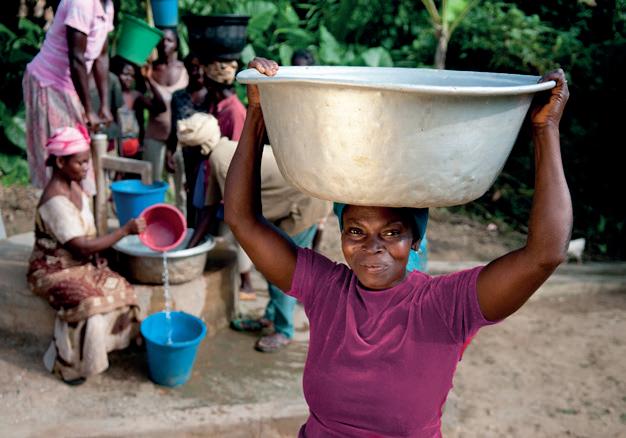
Ethiopia
Water and sanitation at ánd around schools
5
Uganda
WASH & Learn, innovation water projects


Vietnam
Drinking water for disadvantaged minorities

WATER BY WOMEN IN NEPAL
In Nepal, many men leave the villages for the cities to earn an income. Women are left behind but are not used to developing economic activities, which means that they remain stuck in a poverty trap.
Because many people from low castes live in these areas, they get fewer opportunities. We are now giving them a chance.
1 Nepal: Sindhupalchowk and Dolakha
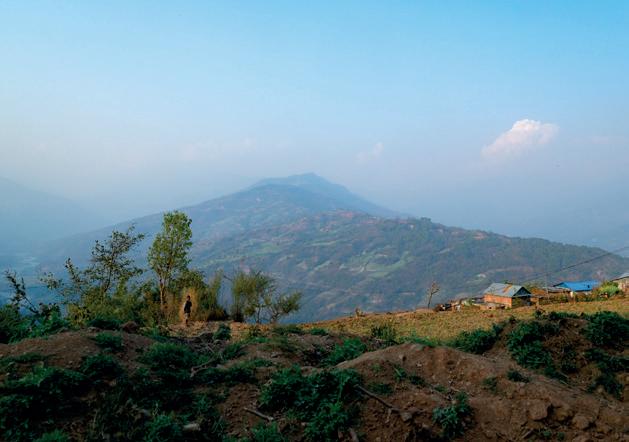
WOMEN
to become entrepreneurs of their own water supplies

“We not only educate the women about water and hygiene, but also about entrepreneurship.”
How?
In northeastern Nepal, many water supplies of the past have been mismanaged or broken during the major earthquake of 2015.
We train women to repair or build water supplies on their own and to set up their own businesses.
We work according to a train the trainer principle so that we can reach many people very quickly.
This is how we train 5000 women. They will soon start 20 water companies and give at least 25,000 people access to water.

WATER VENDING MACHINES IN TANZANIA
Said developed a super smart system that provides safe water using solar energy: the water vending machine.
After a successful pilot in Nugototo Village, he wants to expand his work to Ngomai. With this he reaches 7,000 people. But that’s not his end goal. His mission is the same as ours: clean drinking water for everyone!
2 Tanzania:
Nugototo (Dodoma region) and Ngomai
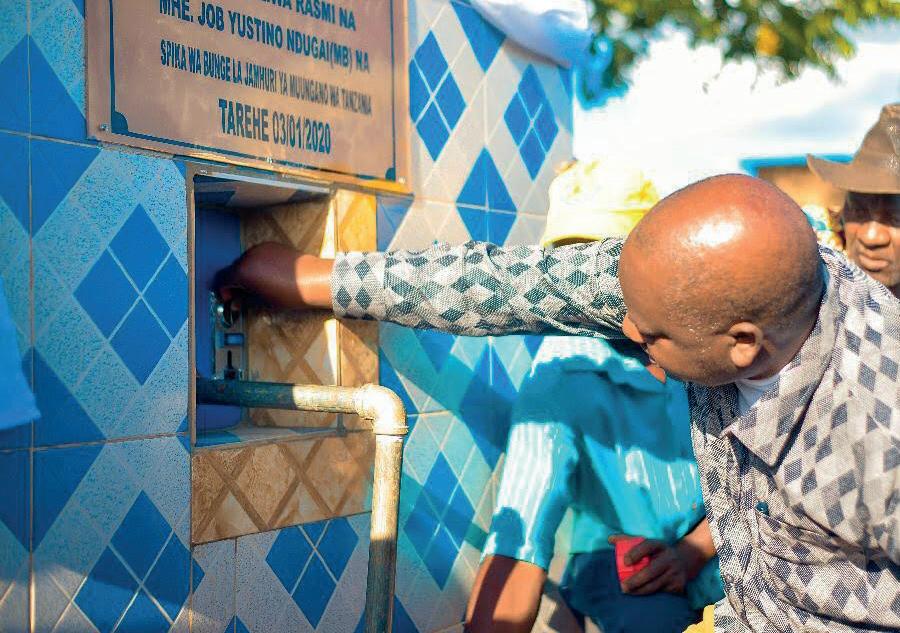
INNOVATE
Water taps with online monitoring and even commercials

“This project has become a flywheel for water throughout Tanzania. The government sees it as best practice.”
How?
Unique about the water vending machines is that they are monitored remotely. This way there is always insight into the use and immediate action can be taken in the event of a defect.
The local population pays a small contribution for the water through tokens so that maintenance is guaranteed. Lighting at the machine ensures that it is also safe at night. Instructions are given via sound fragments, which means that music and commercials can now also be heard. In this way, the machines become gathering places for the local population.

MAX TAP WATER BANGLADESH
In Bangladesh, 73 million people still do not have access to water at home. Especially women and girls spend at least 2 hours a day to fetch water. That water is often polluted, resulting in various diseases and malnutrition.
That is why we are going to build mini water networks in an enterprising way that will pay for themselves. This is how we get a flywheel effect!
3 Bangladesh: Patuakhali, Kalibari, Golachipa & Amkhola

22,800 People get access to safe drinking water.

“Just like our foundation, this project is based on entrepreneurship for sustainable result.”
How?
In Bangladesh we are installing a total of 80 mini water networks to which a maximum of 80 households are connected at a time.
The networks are run by a local entrepreneur in cooperation with the local government. He transfers part of the profit to the holding company, which creates room to invest in even more networks.
This creates a flywheel and we eventually realize water for perhaps two or three times as many people as planned.
FATEMA’S WATER
The heavily pregnant Fatema would do anything to give her children clean drinking water. “I couldn’t risk my children drinking polluted water. The risk of diarrhea or even death is too great.”
And so Fatema walked four kilometers every day until the day of her delivery to the water pump in the neighboring village. Often she had to wait there for hours until all the inhabitants of that village had fetched their water. When it was busy, she sometimes even had to go home with an empty jerry can in the evening.
The repair of the water pump was therefore greeted with joy by Fatema and her fellow villagers. Fatema is incredibly happy. “My children can safely drink water and can go to school every day because they are not sick.”
In Africa, drinking water is often life-threatening. When we are thirsty, we walk to the tap, fill our glass and take a sip of water. A simple act that we don’t even think about anymore. How different it is for millions of people in Africa!

“Until the day of the delivery I fetched water. That took all day. Now only half an hour.”

“It is shocking that so many people are still trapped in a poverty trap due to lack of water.”
ROBIN’S WATER
“We have a mission: clean drinking water for everyone. So we want to be able to invest as much as possible in water projects. We don’t do that by holding out our hands, but by always offering added value.”
At the end of 2014, Robin founded the Made Blue Foundation together with Frank and Machiel. The trio had already experienced a lot in previous adventures with sustainable beef, second-hand clothing stores and CO2 compensation. Everything on blue became the motto. It was high time to do something about the most important problem for the world: the lack of access to clean drinking water.
Made Blue started mirroring the water footprint of large companies in 2014. Later, the water in the catering industry was added. Made Blue now also supplies water coolers to various offices and its own reusable bottle.
“So we make water from water. In this entrepreneurial way, we manage to get donations from more than 600 ambassadors to come back every year.”

WASH & LEARN IN UGANDA
This project is a follow-up to Said’s water vending machines in Tanzania. Innovation was central to this, with the vending machines as a result. Now we are expanding to Uganda to provide water to communities there as well.
However, that does not mean that we can take exactly the same approach. We have to look at how we work per location.
4 Uganda: Ngutoto, Ndaribo, and Matanana

16,342 People get access to safe water and hygiene.

“We educate girls about hygiene at a young age because they are much more receptive then.”
How?
We really run this project together with the local population. They themselves often know better what works and what doesn’t.
This is how we arrived at what we are going to do here: realize 15 new water points, rehabilitate 3 old ones, 19 rainwater collection tanks and 15 hand washing points.
One of the surprising innovations is that households and schools have started vegetable gardens with waste water and thus earn an extra living and have good food themselves.

WATER AT ÁND AROUND SCHOOLS IN ETHIOPIË
In Ethiopia, we provide people with clean drinking water and safe sanitary facilities. We do this at twenty schools, but also in the communities around those schools.
For example, by building kiosks on the outside of the schools including small shops. In total we reach 35,100 people, but specifically also 15,300 girls.
5 Ethiopia: Addis Ababa and Oromia

SCHOOLS
Get water and sanitation and the neighborhood participates

“Girls miss a week of school when they have their period because there are no facilities at school.”
How?
During school hours, the kiosks provide safe and hygienic sanitary facilities.
We also hope that this will reduce the rate of absenteeism among girls by at least 50%.
The facilities are managed by local entrepreneurs and are also accessible to the neighbourhood: toilet and shower use and the sale of sanitary items for a small fee.
Proceeds are used to maintain and expand local facilities and to ensure continued income for the facility managers.

WATER FOR MINORITIES IN VIETNAM
This project focuses on the municipality of Dien Quang in the Ba Thuoc district. This municipality is mainly inhabited by the Muong – a minority group in Vietnam – who is not seen as a priority by the government.
By setting up a water company that schools and households can connect to, these people will finally have access to safe drinking water.
6 Vietnam: Dien Quang in Ba Thuoc

3,572 People get access to safe drinking water.

“The locals use a water source next to the cemetery. This water is seriously polluted.”
How?
By setting up a water company, households can connect to a water network.
They do pay a contribution for this so that maintenance and repairs are covered.
The school children also receive water and information so that they can grow up healthy.
The project is so successful that it even made the national news.
There is still room for expansion in the future.
IMPACT JOURNEYS
We visited our WASH & Learn project with our ambassadors in Uganda where we realize water in and around schools in an innovative way. Will you also join us on our next trip?

Impact Journey
Want to see how donations are spent? We regularly organize an impact journey in which you, as an ambassador of Made Blue, can experience for yourself how we work together on access to clean drinking water in our projects.
School children
Water at school ensures that girls in particular go to school more often.


Unforgettable
Without exception, our ambassadors call this trip an life-changing experience.
Local community
In every project we involve the local people for the management of the water supply.


How it was
It is confronting to see where the schoolchildren first had to get their (polluted) water from.
600+ AMBASSADORS
More and more ambassadors in increasingly more countries contribute to our mission.


From multinationals to SMEs Made Blue is supported by more than 600 companies worldwide.
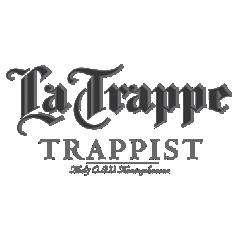























WITH ONE LITRE FOR ONE LITRE
Mirror the water consumption or water savings of your product, service, customer or organization with the same number of liters of clean drinking water in developing countries: one litre for one litre.
Tangible and transparent
With one litre for one litre you make very concrete what impact you make and where. Moreover, it is clearly linked to your product, service, customer or entire organization. We support you to communicate your contribution to our mission. In this we go much further than others.
For example, you receive a certificate with your meter reading every year and you can distribute subcertificates to your customers.
For every 33 cents we make a guaranteed 1000 liters of water available in projects that we are sure will last 10 years or more.
This is how we work on clean drinking water for everyone!

Join Accor, Bottle Up, Bunzl, Hotelgift, La Trappe, MAAS, Novotel, Quooker, Tennant, Vebego, and many other companies!

33 cents is needed to balance 1000 litres of water savings

“That’s how we emphasize how sustainable our product is.”
Jorge Moonen, Tennant
IN HOTELS
Entice your guest to save water in the hotel room. This is possible without sacrificing comfort and with a positive business case! Especially if the guest knows that the saved water will be donated to a family in a developing country.

How much can you save?
Saving on cold water naturally saves money, but with the rising gas prices it is particularly interesting to save hot water of course.
If you can encourage your guest to shower only 5% shorter, you will earn back the donation to Made Blue. Every extra second equals money.
5% is about 22 seconds if you assume an average shower time of 7.5 minutes.
This should certainly work if you, as a hotel, set a good example by, for example, serving local water in your restaurant. With a smart shower head or modern faucets, you can also save even more without the guest having to notice.
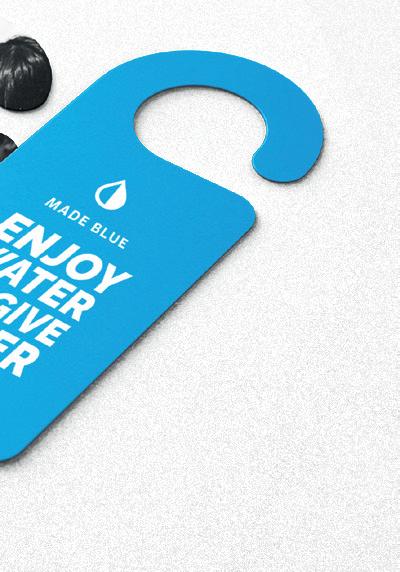

Complete package
We not only help with saving water in the room, but also offer a total package around water in the hotel. Also let your guests drink locally tapped water in your restaurant or offer reusable water bottles in combination with a tap in the lobby instead of pre-packaged water.
100 litres is what one family uses per day and costs only 5 cents per night.
“Donating with a positive business case is unique.”
Novotel Maastricht

AT WORK
Donate a fixed amount per month and enjoy chilled and sparkling water at work from a water cooler. That is not only tasty but also sustainable.
In addition, you provide 1,000,000 litres of clean drinking water per machine.

Rather water than coffee
Does pure water hydrate better than coffee and tea?
No, no evidence has been found for this yet. It is true that the intake of caffeine (and theine) makes you excrete more urine, but this does not outweigh the hydration benefits of the water in the drinks themselves because they consist largely of water.
Caffeinated beverages have been associated with stomach upset, increased heart rate and insomnia. Water is also much better for your energy level. Coffee (and tea with sugar) causes an energy peak followed by an inevitable trough that makes us want to drink even more coffee. So grab a nice fresh glass of water next time.

For every setting
Water coolers come in various shapes and sizes: on the surface, built-in and free-standing. There is a suitable cooler for every workplace. We are happy to advise you. There are even coolers that also offer hot water or the choice between lightly sparkling and strongly sparkling.
1,000,000 litres Makes 136 people in need drink with you.
“This offers a healthy treat for our employees and a nice business card for our guests.”

IN HOSPITALITY
Donate a fixed amount per month for a water cooler and glassware from Made Blue. Then you always provide 1000 times as much clean drinking water. We are usually cheaper than spring water, but then a lot more sustainable and with much more impact.

Spring water or tap water?
Spring water is nothing more than water from a source that has been bottled elsewhere. That can also be the lead. Did you know that people in Utrecht actually shower with a wellknown brand of spring water?
The quality is therefore the same than tap water, but with a lot of transport and waste.
To make your own brand of spring water, you really only need bottles and a tap. However, if you want to be able to offer chilled and sparkling water, a water cooler (water tap / machine) is required.
This cooler cools the water that comes out of the pipe, filters it and possibly adds carbon dioxide to it to make sparkling water.
700 litres is 1000 times the content and enough for a week of water for a family.

Why pay for tap water?
We deliberately do not ask entrepreneurs to put our water on the table for free or a very low price. We want to be an attractive alternative to spring water, also financially. Only then can we count on entrepreneurs continuing to donate to us on a structural basis.
“No overflowing glass containers and perfect quality.”

ON THE ROAD
Go for refillable bottles made of sustainable materials or opt for smart disposable packaging.
We always have a solution for you and always provide 1,000 times the content of clean drinking water in developing countries.

Bio bottles are affordable, print all around, made in Holland and 100% BPA free.


Sturdy or stylish stainless steel bottles can be printed or engraved and are also available as a thermos flask.




“It shows our customers how we work on sustainability and promotes our brand.”
This Bottle Made Blue is refillable and can be printed completely to size. It even competes in price with PET bottles. Ideal for giving away. From 100 pieces.
Use Pop-up cups as disposable packaging with minimum waste volume with maximum printed surface.
OUR POLICY
We only select water projects from reliable local partners where maintenance is guaranteed and information is provided, preferably together with people from the local community.
With a small team we minimize costs in order to make as much impact as possible in the countries where we work. And we do that as transparently as possible.
Doing more than promised
We measure our results. As it turns out, we often realize much more liters than we promise and we reach more people with clean drinking water.
Our projects are also organized in such a way that they will last much longer than the 10 years that we guarantee.
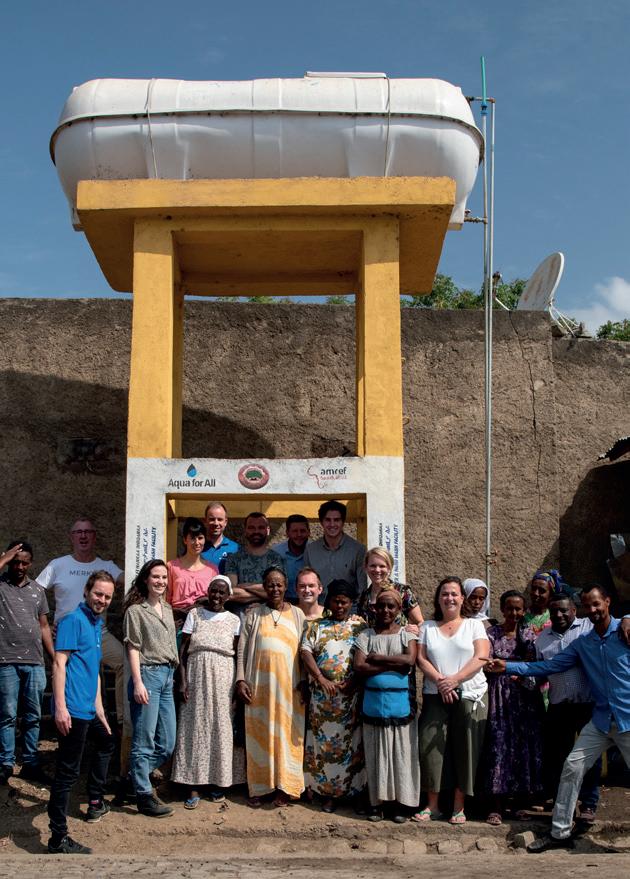

Hester


Tabitha
CONTRIBUTE TO OUR MISSION




One Litre for One Litre
Link a product or service to a tangible number of litres of clean drinking water, just like i-team, Hotelgift, Quooker of MAAS.
Bottle Made Blue
Give your colleagues, relations or guests the most affordable sustainable water bottle, available from 100 pieces.
Made Blue Water
Choose our water coolers or sustainable bottles and enjoy the best water for the world at work, in your restaurant or hotel.
Scan this QR code and give one child water and hygiene at school for a year with just 2 euros.



